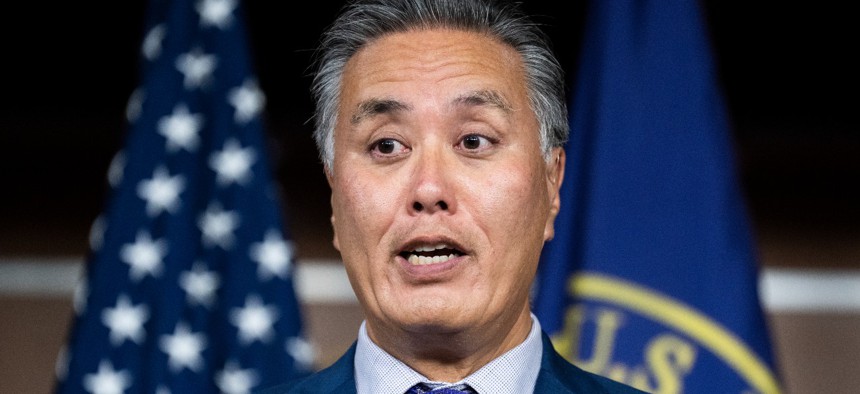
Rep. Mark Takano, D-Calif., sponsored the bill. Tom Williams/CQ-Roll Call, Inc via Getty Images
The House Passes a Bill to Give VA Medical Employees Greater Union Rights
The VA Employee Fairness Act would grant medical professionals the right to bargain over scheduling and official time, and to file grievances over pay disputes.
The House on Thursday voted 219-201 to pass legislation that would expand the collective bargaining rights of medical professionals at the Veterans Affairs Department, allowing them to negotiate over issues related to patient care and clinical competencies.
Physicians, dentists, registered nurses and physician assistants at the VA are hired under Title 38 of the U.S. Code, which prohibits collective bargaining over care and competency issues, as determined by the department’s secretary. During the Trump administration, that exception to collective bargaining was vastly expanded—and labor leaders and Democrats say, exploited—to include issues such as shift scheduling. Then-VA Secretary Robert Wilkie used it to ban Title 38 union officials from accessing official time altogether.
Although the inauguration of President Biden portended a “reset” to labor relations across the federal government, union officials said in August that the VA’s chief negotiator continues to harbor a wide view of Title 38’s collective bargaining exceptions, claiming in negotiations with the American Federation of Government Employees issues like how monetary awards and retention incentives are awarded are nonnegotiable due to the provision.
The VA Employee Fairness Act (H.R. 1948), introduced by House Veterans' Affairs Committee Chairman Mark Takano, D-Calif., strips the department of its ban on negotiating over issues of patient care and competency for Title 38 employees, effectively giving them full Title 5 collective bargaining rights and providing parity both with other VA workers and medical professionals at other federal agencies.
On the House floor, Takano described Title 38’s collective bargaining exceptions as an “arbitrary” decision, and said his bill would restore fairness to the federal medical workforce.
“Title 38 health care professionals like nurses, doctors, dentists and physician assistants do not have the same rights as psychologists, social workers, pharmacists and licensed practical nurses,” he said. “Meanwhile, the same professionals at Department of Defense hospitals have full collective bargaining rights. You heard that right: a registered nurse has collective bargaining rights at DoD, but not at VA. This is the kind of legal contortion that should be fixed.”
Takano said that the issue is particularly problematic for the department, given plans to greatly increase staffing as it works to implement the Honoring Our Promise to Address Comprehensive Toxics (PACT) Act, signed by Biden earlier this year.
“VA is planning to ramp up its hiring over the next five years, and in order to attract the most qualified workforce, we need to ensure that it’s a great place to work,” Takano said. “Employees on the front lines of veterans health care deserve and need basic worker protections, and that means a nurse needs to be able to ask that their pay errors be resolved.”
Rep. Mike Bost, R-Ill., opposed the bill, suggesting that the measure “could” impact veterans’ access to care.
“These very specific exceptions were made for a reason,” he said. “The secretary is responsible for ensuring veterans receive high quality and timely health care. To do that, he must have the authority to make difficult decisions to keep hospitals running safely and to put veterans first . . . H.R. 1948 will tie the secretary’s hands, and I worry enacting this legislation will put patients at risk.”
Takano said those fears are unfounded, noting that federal law does nothing that would impact the department’s ability to remove poor performers or otherwise hamstring the VA secretary’s authority.
“Title 5 states that collective bargaining does not include policies, practices and matters ‘to the extent that such matters are specifically provided by federal statute,’ and there are many laws that define the scope of collective bargaining," he said. “Title 38 section 7464 is still on the books, which controls the disciplinary appeals boards. I would remind my colleagues that H.R. 1948 would only allow unions to grieve items under its contract with VA, and if it’s not in the contract, the grievances can’t occur.”
The bill now heads to the Senate, although it is unlikely to receive a vote before the end of the congressional term at the end of the year.







